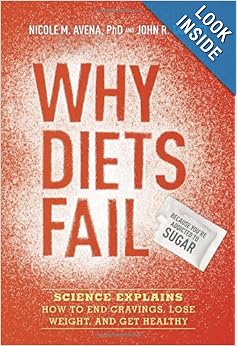
Dr. Nicole M. Avena is the author of Why Diets Fail (Because You're Addicted to Sugar): Science Explains How to End Cravings, Lose Weight, and Get Healthy and the subject of this NPR story.
This revolutionary eating plan reveals definitive proof that sugar is addictive, and presents the first science-based program to cut out the sugar, stop the cravings that cause most diets to eventually fail, and lose weight--permanently.Sugar (as well as gluten) is one of the most destructive substances in the human diet. Sugar acts much like heroin in the brain - a lot of dopamine gets released. The dopamine flood is not as great as with heroin, but it has many of the same addictive properties.
If you’re like most people, you’ve tried a few (or maybe many) different diets without success. The truth is, most diets work for a while, but there’s usually a point at which the dietary restrictions become too difficult to maintain. Why? Because whether you’re following a low-carb, paleo, gluten-free, or even an all-liquid green juice diet, the addictive nature of sugar causes cravings to take over and sabotage your diet-of-the-moment.
In Why Diets Fail, Dr. Nicole M. Avena and John R. Talbott reveal definitive proof that sugar is addictive and present the first science-based program to stop the cravings and lose weight—permanently. A neuroscientist and food addiction expert, Dr. Avena has conducted groundbreaking research showing that sugar triggers the same responses in the brain as addictive drugs like cocaine, nicotine, and alcohol. And like those other substances, the more sugar you eat, the more you need to get the same pleasurable feelings. (No wonder your last diet didn’t stick.)
Avena and Talbott’s eight-step plan walks you through the process of going sugar-free and surviving the make-or-break withdrawal period—those first few weeks when your body feels the absence of its favorite sweetener most acutely. An easy-to-use Sugar Equivalency Table developed by Talbott lists the amount of sugar in hundreds of common foods so you know precisely what to eat and what to avoid. And when it comes to what you can eat, you have a lot to choose from. In fact, you’ll probably eat more on this diet than you normally do—while continuing to lose weight.
This science-based program is the diet to end all diets. It will help you break the yo-yo dieting cycle, end those maddening sugar cravings, and develop a new longing for the good food that will keep you fit, healthy, and happy.
Why Sugar Makes Us Feel So Good
by Eliza Barclay
January 16, 2014
Last week, I reported that scientists are working their way toward a consensus that sugar is addictive. While some researchers are still hesitant to liken sweet stuff to drugs or alcohol, the evidence is accumulating to explain why some of us really struggle to resist or moderate our sugar intake. (I count myself among them.)
I mentioned a new book called Why Diets Fail (Because You're Addicted to Sugar): Science Explains How to End Cravings, Lose Weight, and Get Healthy by Nicole Avena, a neuroscientist and research psychologist at Columbia University who has done a lot of work in this area. She's particularly interested in the neurotransmitters and brain receptors involved in eating. In lab experiments with rats, she's shown how overeating tasty foods (like sugar) can produce changes in the brain and behavior that resemble addiction.
Avena has also just put out a clever TED-Ed video with colorful visuals to help explain the details of just why sugar makes our brains go bonkers.
As the video shows, the key player in the reward system of our brain — where we get that feeling of pleasure — is dopamine. Dopamine receptors are all over our brain. And doing a drug like heroin brings on a deluge of dopamine.
Guess what happens when we eat sugar? Yes, those dopamine levels also surge — though not nearly as much as they do with heroin.
Still, too much sugar too often can steer the brain into overdrive, the video says. And that kickstarts a series of "unfortunate events" — loss of control, cravings and increased tolerance to sugar. All of those effects can be physically and psychologically taxing over time, leading to weight gain and dependence.
The takeaway is pretty clear: If you're sensitive to sugar and inclined to indulge in a supersugary treat, do it rarely and cautiously. Otherwise, there's a pretty good chance that your brain is going to start demanding sugar loudly and often. And we're probably better off without that extra voice in our head.
No comments:
Post a Comment